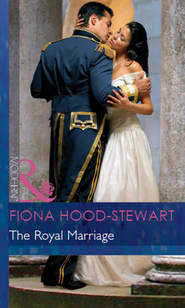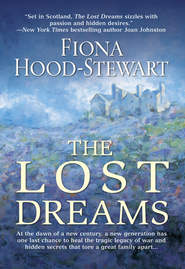По всем вопросам обращайтесь на: info@litportal.ru
(©) 2003-2024.
✖
Southern Belle
Автор
Год написания книги
2018
Настройки чтения
Размер шрифта
Высота строк
Поля
“Who says we like smart and independent?” Johnny queried with a teasing gleam.
“Well!” Grace huffed. “Anything would be better than that creature you were parading at the Kentucky Derby last year.”
“True, Mother, a mistake, I admit,” Johnny conceded, remembering the model he’d invited at the last minute. “And as for trying to push suitable women in my direction, Mother dearest, please don’t.” He rose, shoved his hands in the wide pockets of the robe and sent her a laughing but firm smile.
“He’s right, Mother, no canny little intros, okay?” Liam seconded.
“You’re both impossible.” Grace threw up her hands, sank among the cushions and shook her head. But she smiled all the same. “I suppose I just have to be thankful for small mercies,” she sighed, referring, Johnny knew perfectly well, to Nicky’s summary disposing of Lucia.
With a laugh he left the room and headed on upstairs, planning to get on with some work before the holiday really began.
6
Dusk hovered, enveloping the small old-fashioned mountain train as it began its gentle climb into the Swiss Alps, leaving Montreux and Lake Geneva below, shrouded in a veil of December evening mist.
Seated in the wide velvet seat of the carriage, tired after the exertions of the journey and the tension of the past few days, Elm leaned back, folded her hands and looked about her appreciatively, relaxed for the first time since boarding the plane in Atlanta. It was exactly as she remembered: the carved wooden bar serving hot chocolate and tea, the gleaming brass luggage rails and pristine starched white linen squares to lay your head against. She smiled, feeling her jet lag dissipate, strangely comforted by the discovery that time had preserved her memories.
Leaving Savannah and the plantation had proved much easier than she’d expected. In fact, as momentous as the step away from that world had seemed, actually taking it had been surprisingly simple, and she was almost dizzy with relief. Not even the lingering concern that her father would be disappointed and angry about what she’d done was enough to dim her newfound sense of conviction.
Harlan and the pain of his betrayal couldn’t touch her here, she realized, her smile growing, illuminating her soft brown eyes and curving her full mouth. She savored the sense of freedom, suddenly grateful that she was seated by herself on the MOB and heading to Gstaad, a place where she’d gone to boarding school and spent so many happy moments of her adolescence. A month ago she wouldn’t have believed it possible. But then, a month ago she’d still been drifting in a gray fog of denial. And now her vision had cleared.
Elm glanced around the carriage and wondered if all she’d lived through the past few days showed. Her lips twitched. She doubted that the plump gray-haired lady in the seat diagonally opposite, reading a newspaper through thick, purposeful lenses, was remotely interested in her carriage-mate’s tribulations. The knowledge that no one here knew—that absolutely no one would send pitying glances, make catty or well-meaning remarks—was bliss. Not that those things should matter, she reminded herself. She’d followed society’s rules and dictates for too long, and all they’d ever brought her was pain and anguish. From now on, she vowed, she’d make her own rules.
With a satisfied if still shaky sigh, she peered through the large train window, but the brightly lit carriage made it hard to see out. For a moment she stared at her own reflection with new awareness. She was filing for divorce, turning her well-ordered world upside down. But despite all the upheaval, the tension lines around her mouth had eased and her eyes held a glimmer of something—could it be hope?—that she hadn’t seen for some time. Maybe it was just an illusion, but the mere fact she’d found the courage to come here filled her with a sense of optimistic expectation, as if she’d been given a new lease on life. She was thirty-four years old, yet inside she felt fifteen, suddenly young and ready to face her future all over again.
Pressing her forehead against the chilled windowpane, Elm bit her lip and gazed at the ice-covered stream hugging the railroad tracks. Above the stream, dark pine trees grew taller and taller as the train climbed, their thick branches sagging under the weight of sharp icicles and ten inches of fresh snow.
Elm swallowed and finally let out the long breath she’d been holding. She had every reason to agonize, but so many more to rejoice. After all, she’d faced the truth, confronted the fact that she’d been living in a sleepy world of illusion, and finally forced herself to wake up and take the upper hand. Her one regret was that it had taken her this long. Of course, the immediate future was easy—a long-awaited and much-needed vacation. Going back would be far more complicated. Aunt Frances—the one person other than Meredith whom she’d revealed her plans to—had said as much.
And Aunt Fran was right. There would surely be times ahead when she’d miss the stability, however stultifying, of her former life. Living on her own in her home city, where people would still think of her as Senator Hathaway’s daughter and Harlan MacBride’s wife, might prove very uncomfortable. There would be the inevitable snide comments and cold shoulders, perhaps even a tabloid assault full of distortions. But right now she didn’t care about any of it. She’d face that hurdle when she came to it.
For frankly, she no longer cared what people thought. Savannah would just have to get with the new program or go get a life, she decided, breathing on the pane and drawing a smiley face on the glass with her fingertip. Then she remembered her father and her finger stilled, her ebullience fading. She loved him dearly, and the knowledge that he would never understand her reasons for divorcing Harlan, however valid, made her profoundly sad. She took a deep breath and sat back against the green velvet seat, acknowledging that this was the main reason, however cowardly, that she’d left Savannah without leaving word of where she was going. Aunt Frances had insisted, in her uniquely feisty fashion, that like it or not, Daddy was going to have to learn to put his daughter first for once. But Elm knew there was little use trying to explain. He would never listen. He’d merely offer irrefutable arguments about why her choices were all wrong.
The carriage door opened, cutting short her negative thoughts and the inevitable guilty feelings they aroused. Instead, Elm concentrated on the rotund, pink-cheeked ticket controller dressed in a neatly pressed navy blue uniform, a bright red leather satchel slung over his shoulder.
“Présentez les billets, s’il vous plaît.”
Elm responded easily, happy to see her French wasn’t too rusty, and produced her ticket. It felt good to hear that slow lilting Swiss accent once more, to know she was truly back. Then, as she returned the ticket to her large Hermès purse, another attendant appeared offering refreshments. She wasn’t at all thirsty, but the idea of tasting steaming hot Swiss chocolate again was irresistible. So what if it was loaded with calories and cholesterol? Her personal trainer wasn’t here to harp at her, was she? In fact, not one single person here would criticize or tell her how she should be leading her life.
Rebelliously tossing her hair back, Elm smiled at the woman and ordered a large hot chocolate with whipped cream. A minute later she was taking the piping-hot cup from the gracious attendant, breathing in the delicious, un-forgettable aroma, eyes watering as she sipped cautiously. Savoring the familiar taste, she was able now to take a critical look back at her moves over the past few days. To her own amazement, she, who’d always been considered vague and fey, had proved immensely efficient. She’d found replacements for all her charity duties, handing over the garden project to Joan Murdoch, her competent assistant, who was more than happy to oblige. She had packed up her paints and canvases and left instructions for the staff at Oleander and the house in town, as though she hopped off to Europe at the blink of an eyelid every day of the year. She’d even managed to find someone to man her booth at the Daughters of the Confederacy bazaar—no mean feat, since the fund-raiser was notorious for being the most tedious event of Savannah’s holiday season.
Incredible, she mused, relishing the rich, creamy drink and her own capabilities. Life had sent her an inside curve ball, and instead of despairing, she’d rallied and was experiencing an exhilarating rush of satisfaction. And it was incredibly uplifting to be free of Harlan’s constant recriminations and barbs, and her father’s subtle disapproval, she reflected ruefully. He always made her feel as though she could be doing better.
Placing her hand against the glass once more, Elm peered out again through the growing darkness to the twinkling lights of the distant chalets dotted on the snowy peaks. What must it be like to live up in a small wooden mountain dwelling, cozily ensconced behind red-and-white-checkered curtains, a blazing fire roaring in a rustic chimney? she wondered dreamily. She could easily imagine a family—little blond-pigtailed girls and boys in smocks—seated round a carved kitchen table, digging into large portions of rösti, the delicious Swiss equivalent of hash browns, and commenting on their day’s work, their hopes and fears. The cows would be huddled in the barns for the winter now, each animal ensconced in a stall with its name carefully painted above, next to the huge bells that would be donned again in spring when they returned to pasture and joined the poya—the famous yearly trek up into the legendary Swiss Alps.
As she stared deep into the night, following a tiny beam of light flickering up on the mountain, Elm remembered that as a student here, she’d been drawn to the sense of timeless serenity the mountains exuded, to the quiet rhythms of alpine life, always envying its apparent simplicity. Of course, now she knew that life, no matter where it was lived, was never simple.
The train stopped at several stations. First Les Avants, where in May the slopes were covered in radiant white blankets of sweet-smelling narcissus. Then Château-d’Oex, where Aunt Frances and her mother, whom she could barely recall, had attended finishing school long ago. Then the train chuffed past Rougemont—wow, how the town had grown, there had never been that many lights before—with its ancient seventeenth-century chalets bordering the tracks, and on, down into the low-lying mists of the Saanenland toward her final destination.
It was snowing hard when the train finally pulled into Gstaad station and Elm got up, excited, her tall, slim figure clad in elegant suede pants and a cashmere sweater, and hastened to the door of the compartment. She smiled and thanked a kind middle-aged man who stepped forward and helped her remove her luggage from the rack. Then, pulling on her long mink coat, she flung open the window and leaned perilously out before the train had come to a complete stop, watching eagerly as another slim, fur-clad figure hurried down the tiny platform, waving.
“Gio! Oh, my God!” She laughed, immediately recognizing Gioconda and waving back enthusiastically. As the train came to a halt she hauled her bags down to the platform and the two women tumbled into each other’s arms.
“Cara, I can’t believe it. You’ve finally made it! You should have let me send the car to the airport to meet you, darling, instead of using this uncivilized public transport,” Gioconda exclaimed, enveloping her in a perfumed embrace before beckoning to the porter. “Take the bags to the car over there, please.” She pointed and smiled, then turned once more, holding Elm at arm’s length and looking her over critically. “Bella. How marvelous to see you. You look beautiful, as always. A little pale perhaps, but that will soon be taken care of. I’m so thrilled you came.” She gave Elm another hug.
“So am I,” Elm’s eyes glistened as they linked arms and followed the porter under gently falling snowflakes to a gleaming four-wheel drive parked on the curb next to the yellow postal bus. Elm glanced at it nostalgically, welcoming yet another reminder of her school days.
While Gioconda chattered, Elm stared at her surroundings, allowing it all to sink in, still unable to believe she’d actually made it back to “her” mountain. She bit her lip and stood, hand on the car door, looking up through the snowflakes at the Palace Hotel, still rising like an enchanted castle, turrets brightly illuminated above the fairy-tale village, casting its magic spell over the wooden chalets lying peacefully below, their pointed eaves outlined by tiny trails of Christmas lights. Elm breathed deeply, filling her lungs with the chilly mountain air, and sighed. Already she felt like a different woman, as though she’d finally stepped out of a quagmire onto solid land.
“Stop painting pictures in your head and get into the car, cara,” Gioconda urged, laughing, moving to the driver’s seat while the porter placed the bags in the back.
Elm smiled absently and climbed into the vehicle. Barbra Streisand’s “Memories” played on the CD deck. It was wonderfully appropriate. For a moment her eyes filled, and she leaned back against the soft leather seat, overwhelmed by emotion. Gioconda drove past the skating rink, where a group of young girls in bright, billowing ice-skating skirts twirled gracefully under the heavy flakes, like ballerinas in a music box. Elm swallowed hard, touched by how perfect it all was, how untainted and lovely and precious. Almost too good to be true.
Could seventeen years really have passed since she’d done figure eights on that same ice herself? And what had she achieved since then? she wondered. Then she pulled herself up with a jolt. It was pointless to get maudlin, as Aunt Frances would say. What mattered was that she was here now, almost as though she’d had to return to her beginnings to start all over again.
“I can’t wait to introduce you to everyone,” Gioconda was saying, bringing Elm back to the present. “There are several people already in town. A couple of old Roséens, Jim Talbot for one. Remember how fat he used to be?”
“No wonder. He lived at von Siebenthal’s bakery eating doughnuts, if I remember correctly.”
“Damn right. Anyway, he’s quite slim now.”
Elm shook her head. It all seemed part of another world and she felt suddenly ashamed that, barring Gio, she had not kept in touch with her old school pals.
“You’ll never believe me when I tell you who I saw the other evening.”
“Who?” Elm asked, grinning.
“Johnny Graney. Now, you remember him. You had a mega crush on him.”
Elm frowned, then nodded, laughing. “Of course I remember. Is he still as devastatingly handsome? I used to lurk around the basketball court during practice, hoping for a glimpse of that killer smile. Gosh, how silly we were in those days.”
“Deliciously, wonderfully silly,” Gioconda agreed, driving through the tunnel, then out at the roundabout and past the mölkerei—the local dairy.
“Gee, it’s still there,” Elm exclaimed, delighted to see so little had changed. “Are the yoghurts still as scrumptious?”
“Absolutely. You’ll have some for breakfast tomorrow morning.”
They turned right and drove on, up past the Park Hotel. A few meters later the car veered right again into a small side road and Elm could see Gioconda’s chalet twinkling through the layer of snow being swished rhythmically back and forth by the windshield wipers.
“I can’t believe it,” she exclaimed, a frisson coursing through her. “Everything looks exactly the same,” she marveled as they turned into the driveway and she was able to distinguish the chalet properly. “Do you remember all those wonderful weekends and vacations we used to spend here, Gio? It seems like only yesterday.”
“Don’t remind me,” Gio groaned dramatically, “I’ll be thirty-four next month. Can you imagine? Me? Positively ancient.”
“Rubbish,” Elm laughed, “You’re as gorgeous now, Contessa, as you’ve always been and you know it.”
“Bah! Non lo so. The men seem to think so, but I have a mirror. I’m seriously contemplating some of those injections I hear so much about.” Gioconda’s eyes twinkled. Then she shrugged as only Italians can shrug and sent Elm a mischievous grin. “But, anyway, you’ll be happy to know, cara, that the chalet only looks the same on the outside. I’ve redecorated the interior completely, thank God,” she added. “Remember those dreadful brown velvet chairs of my grandmother’s?”
“I do.” Elm grinned back, recalling Gioconda’s pithy comments at the time. At fifteen, Gio had already possessed a tremendous sense of style, she realized, amused. “What color are they now?”











